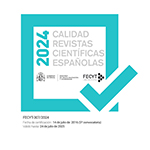Impacts of the workshops, qualifying and mediation of multipliers and sessions with users of digital inclusion programs in Brazil: an assessment from a multivariate analysis
Abstract
This article aims ats evaluating the results of the process of digital inclusion among the supposedly included users of digital inclusion points, promoted by programs and projects of the Government and its partners, after having gone through qualification processes, workshops and other forms of mediation. The evaluation has as base the identification of variables that better explain the inclusion process and a multivariete analysis of these variables. Thus, factors had been identified that would allow to detect factors that have an impact in the inclusion process, such as the context of the user, his or her demographic profile, the social conditions, the use of and access to information and comunication technologies - ICTs, but also the evaluation, use and search of information by the user. An example is the search and employment of the information for the welfare of the community. In this study changes were detected to the degree in which explanations of variable or indicators are considered for the user to feel included, such as: sex, color/race, access to broadband Internet, infrastructure, available cellular telephone, available digital information in the Internet and social nets and a computer at home. The multivariate analysis selected that the determining factors of digital inclusion are in constant change, as the ownership of cell phone, a fixed telephone and computer at home. It was evidenced that the ones that say they are digitally included were people who believe that Internet changed their lives, know and use the Internet, participate in relationship sites, have the habit of reading the press and news in the WEB. In the study, the issues of schooling and range of income and geographic region continue to determine whether users feel included. Because of the universalization of cellular phones, this represents little to the included ones, which is different from having a computer at home. These results must be seen to the light of the research universe, of people of a disfavoured class, living in places with little telecommunications infrastructure, where the satellite is the most viable means to provide broadband Internet.Downloads
Article download
License
In order to support the global exchange of knowledge, the journal Revista General de Información y Documentación is allowing unrestricted access to its content as from its publication in this electronic edition, and as such it is an open-access journal. The originals published in this journal are the property of the Complutense University of Madrid and any reproduction thereof in full or in part must cite the source. All content is distributed under a Creative Commons Attribution 4.0 use and distribution licence (CC BY 4.0). This circumstance must be expressly stated in these terms where necessary. You can view the summary and the complete legal text of the licence.











